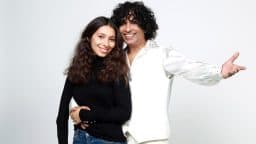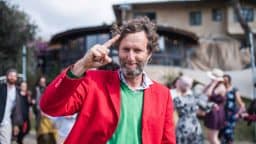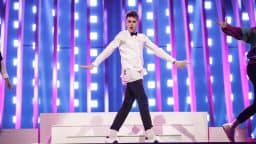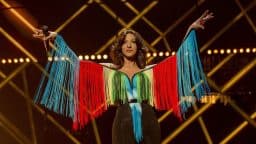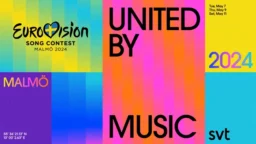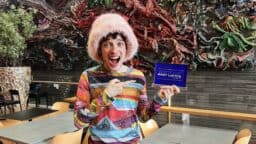Imri Zev (IMRI, 1991) is the young Israeli singer, dancer, actor and model that participated in Eurovision three times. Twice as a backing singer – and then, in 2017, on the main stage, singing I feel alive. Eurostory spoke with him about the impact the festival had, and about his plans for the future.
You have been involved in Eurovision in quite many ways. What has the festival meant for you?
Well, nowadays, a lot of the Eurovision contestants start their career at the festival. Most of them are not famous before they participate. This used to be different, at least in Israel. Singers that already had a career went to Eurovision. But for me, well, it basically changed my world. It was the jumpstart – a big jump, too… It meant everything for me, it was like fulfilling a dream, the dream of becoming a singer, in Israel, in Europe.
But that’s only the singing part. You do so many other things. You’re an actor, you’re a model…
You know, I think that, in this industry, it’s good to do everything, especially in Israel, which is a really small country. But for me it’s all under the same umbrella, the modelling, the acting, and all the other things that I like to do. I wouldn’t call it ‘other things’, it all comes from the same ambition.
Until recently you were studying ‘visual communication’. Was that also one of the things under your umbrella?
I studied visual communication, so yes, it was a part of show business. I studied the production of TV shows and how to make films and clips. It’s the behind the scenes part of what I do. And it was important for me to have a title, a degree.
Did you get one?
Yeah, I’m done. It was a good experience, but I don’t like to study. I’m a free spirit, I like to travel, to sing and to perform, and not to sit too much with books and such.
Were you involved with, let’s say, the video clip for your new song?
No, it was done by professionals, but well, I understand what they did, because that was part of my education.
You’re not going to be the next video clip director?
No, no. I want to be in front of the camera, not behind.
Back to your participation in the 2017 contest: when you think back of that week, what is the first moment that springs to mind?
It’s a bit cliché, but I think it’s the moment we heard we qualified for the final. The moment the hosts called out ‘Israel’. Because you work for three, four months, just for this moment. When you qualify, you can breathe. I mean: the universe decides whatever comes, but this was so important.
Do you remember where you were sitting at that moment, who was next to you…?
Yeah, I was sitting in the green room, with my band and my delegation, and… this was the moment we’d been waiting for. It’s like people telling you: ‘Yes, you did a great job.’ I remember in 2015, when I was a backing vocal for Nadav Guedj, I had seen people jumping like crazy when they heard they qualified. And I told myself: I won’t do that, I will keep to my seat, because it’s so embarrassing. But then they waited and waited with calling out ‘Israel’. And when we heard it, well… you cannot not act crazy, because it’s so… you feel so alive. And so happy that you’re part of something this big. So in 2016 it was the same, when I was a backing singer for Hovi Star, and of course in 2017.
Three times in a row you were jumping.
Yeah. Totally. But it’s fine, you know. It’s authentic.
How about the moment right after finishing your song?
I was performing last in the second semi-final. I had finished my song, and everyone was screaming – like fifteen thousand people. I shouted ‘Thank you’, really loud, ‘Thank you Europe!’ You feel like the king of the world, and… you know, if you haven’t been there, if you don’t know the festival, you can’t understand this feeling. Eurovision is something very, very big. For an artist, for a singer, even for a dancer, for a backing artist, for a manager… for everyone that’s involved in this industry.
Each time before performing at Eurovision you did this ritual…
I think they also did that in Netta’s year: we stand in a circle, we say a few words, and then we’re dancing the Hora. Which is a traditional Israeli dance. We move our legs, we sing an Israeli Eurovision song, maybe Golden boy, or Hora, and then we go to the stage.
Was the adrenaline that you felt as a backing singer comparable to when you were the lead vocalist?
As a backing singer and a dancer, Eurovision is amazing as well. People know who you are and you feel the energy. But when you’re the lead singer, everything is different. The good thing is: when I came to Eurovision, I had done two years of internship. So, I knew what to expect and I could concentrate on my performance.
In your first year as a backing vocal you were dancing and singing on stage, but in your second year, with Hovi Star, you were not on the main stage.
No, we were on another stage behind him, a bit higher. And that was fine, because after 2015 I came back to Israel and I was very sad. How can I explain… I didn’t know what was going on with me. I think I had expected to gain more from Eurovision, for myself, for my career. I thought: when I go to Eurovision, things will happen for me, and they didn’t. I had to go back to college, and I was just a backing artist. The second year, with Hovi, I had understood that I should take it as an experience, not as a career opportunity. Also, at that time, I already thought about joining Rising Star, the Israeli selection process. Hovi and I were really good friends, and he told me: ‘You should do the Rising Star shows, you will win and you will be in Eurovision yourself.’
And he was right. Talking about your own performance: I feel alive must be a difficult song to sing.
It is.
What is the most difficult part?
I think the high notes are very difficult.
The falsetto?
No, not the falsetto, but the high chest notes. But when you come to the city where Eurovision is organized, in my case that was Kyiv, and you have to talk all the time, during interviews, and you do rehearsals, all the time – yeah, that’s hard. And when it’s a difficult song, it’s even harder.
And I guess you want to go to some parties as well.
Well, my managers didn’t let me go partying. You know, I used to go to the Euroclub in Vienna and in Sweden, but in Kyiv they told me: ‘You stay at the hotel, you’re going to sleep at nine.’ So all my friends went and I had to go to bed. But, of course, that’s how it should be.
Did you have any input in the writing process of I feel alive?
When the committee chose the song, the lyrics were different. And as we came to work with the producers and the writers of the song, we said: ‘Okay, listen… there’s a story behind my journey.’ I was a backing artist for two years and that’s the time I started my walk through the stars. Or even before: I tried The Voice, and I was a backing artist in the Israeli National Finals in 2013, for Kathleen Reiter, and all this time I was waiting way too much for something good to come. But now, now I felt alive.
And then they changed it?
Exactly. They did it in, like, five minutes. They were very talented guys.
Right now you are working on new songs.
Yeah.
Are you writing the lyrics or the music?
Both.
Your last song is called Imrico.
It’s a Hebrew-Spanish song and it’s called ‘Imrico’, because that’s a combination of ‘Imri’ and ‘rico’, which means ‘tasty’ in Spanish, or ‘fun, nice, pleasant’, a lot of good things. And the song talks about the two years I had after Eurovision. Two years in which not many things seemed to happen. Well, a lot of things happened, but…
Not to the outside world.
I wanted more things to happen in these two years, and they didn’t, but the song says: now I’m here. It’s a song in which I declare my love for music, for this profession, for this career. It says: ‘Vamonos Imrico’, ‘Let’s go, Imrico’, ‘Let’s do it’.
What is the line you’re most proud of?
It’s ‘Look at me, I’ve been like this for two years, give me your hand and let’s jump into the water.’ It rhymes in Hebrew.
Do you have a plan for more music?
Well, we’re working on another song now, so, yeah.
Will it be a happy song again?
I’m not exactly sure. It’s going to be happy, but it will still be Latin style, like Imrico. Latin, Spanish, Hebrew, that’s what I do.
In the meantime you are involved in many other things. You did a children’s play, for instance. How was it to act for a children’s audience?
There’s this tradition in Israel, where a series of children’s shows are made for Hanuka. One year ago, I took part in one of them. It was amazing, because it’s a big thing. They cast all kinds of famous singers and actors. It was great and it was a really hard job, because we did four shows a day.
Was it even harder than Les Misérables, that you also were a part of?
Yeah. Les Misérables was once a week, or even once every two weeks. It was also a dream coming true, because Les Misérables is one of the most famous musicals in the world.
Talking about musical theatre, do you have dreams in that field?
Oh, I do. I love to sing and to act. Simultaneously.
Getting back to Eurovision – Izhar Cohen, the 1978 winner, told us that it was very important for him to be at the festival as the Israeli representative. He said, ‘I was the flag.’
Of course, because besides the music competition, Eurovision is a country’s competition. A lot of people now say it’s not, because most entries are in English and not in the native language, but the country is behind you and the people of Israel are looking at you, and you’re afraid to disappoint then. And… when Izhar Cohen won, I wasn’t born yet, but I know how it feels when your country wins something. Especially Israel.
Why especially Israel?
Last year for instance, many people thought that Israel couldn’t win, because of politics. And there are politics in Eurovision, of course, politics are everywhere. But Netta proved those people wrong. We can win and we and can organize a beautiful Eurovision edition – well, you’re going to see that. So yes, I did feel I was ‘the flag’, especially when I put the flag around me.
Literally.
It actually felt that I’m representing my country. Totally.
You mentioned politics. Did people try to talk to you about that?
Before Eurovision, we were preparing ourselves a bit for when this would happen, but I don’t remember a lot of questions about that. There were maybe a few, but I’m not involved – I mean I’m involved in what happens in my country, but I didn’t come to Eurovision to talk about that, I came to connect people with music, and I think I did a good job. All the time I said to myself: for three minutes, I want people to forget about their problems. I just want them to feel alive.
It was kinda special that you were the last one to perform in the semi-final and then the first one in the final.
And you know, because of that, I think the game changed a bit. When you are the first one to perform out of 26 entries, it’s hard. And of course it was a disappointment that after being third in the semi-final, we came 23rd. We had a preparation of like six months, we worked on it every day. And then not getting the result we wanted, yeah, it did disappoint me. But, you continue with your life and you continue with your career, and that’s it.
But how did you cope?
You know, on the night, when it happened, I didn’t cry. I was very robotic while we were in Kyiv. Everything was okay, I was very calm. But the moment I stepped into my apartment, everything came out. I cried for a few hours, and then I stopped myself and I said to myself: okay, what am I going to do? I will talk to my managers. We will have a meeting tomorrow. Let’s continue.
And so you did.
Yeah.
Imrico.
Imrico!

